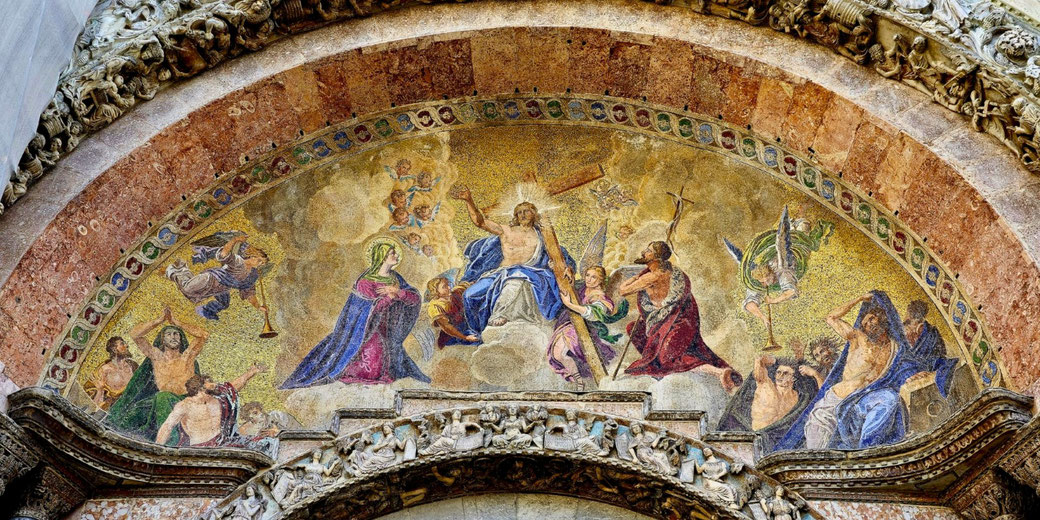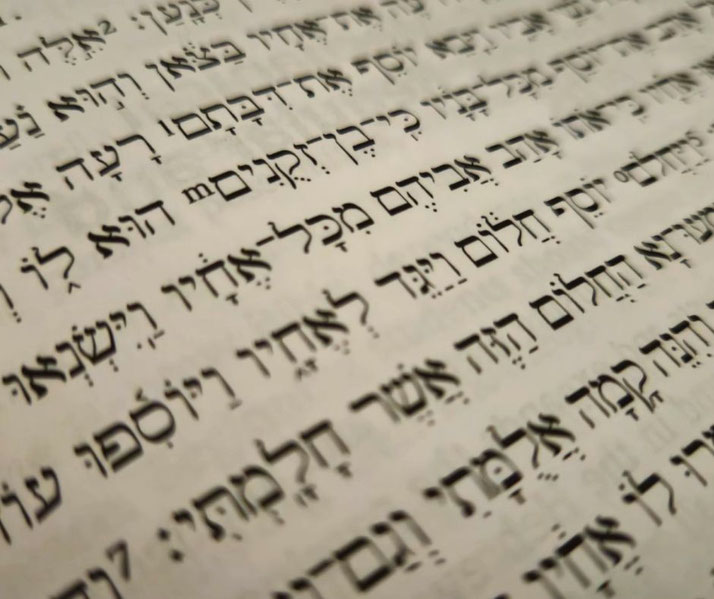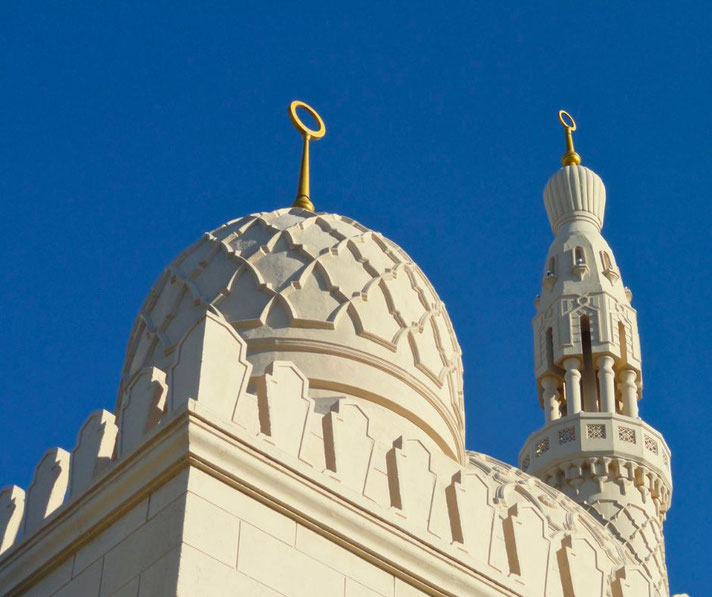Why Judaism, Islam, and Christianity are similar but yet very different

When most people think about the world's major religions, they usually think about Christianity, Islam and Judaism, which share common roots in the Abrahamic tradition.
They all began with prophets who received messages from God.
Who was Abraham?
Abraham is an important figure in the Abrahamic religions. In particular, he is seen as the father of the Jewish people but as a prophet in both Christianity and Islam.
The historical context for Abraham is not entirely clear. According to the Bible, Abraham lived in Canaan around 2000 BC, when the region had many small city-states.
The exact location of his hometown, Ur of the Chaldeans, is not certain. Some experts place it in Mesopotamia (modern-day Iraq).
In Judaism, he is the first Hebrew and the father of the Jewish nation through his son Isaac.
In Christianity, he is a central figure in salvation history as an example of faith, which he demonstrated by his willingness to sacrifice Isaac.
In Islam, he is a prophet and a close friend of God. The Quran praises his obedience to God and says that he built the first house of worship in Mecca.
All three religions trace their spiritual roots back to Abraham, which means that he is a shared ancestor and a symbol of unity for believers.
Judaism
Judaism is the oldest of the Abrahamic faiths, which is based on belief in one God who chose a group called the Israelites or Jews to be his followers.
One key figure in Judaism is Moses, who received the Ten Commandments from God on Mount Sinai in around the 13th century BC, when the people of Israel left slavery in Egypt.
The holy book in Judaism is known as the Torah, which was compiled from ancient Hebrew texts written between 1200 and 300 BC.
The Jews believed that God gave them their own land, called Israel. Later, this land was taken away by foreign invaders in the first millennium AD.
However, many Jews still see Israel as their spiritual home. They worship in synagogues, and their leaders are called rabbis.
Today, there are around 14 million Jews worldwide, most of whom live in Israel or the United States.

Christianity
Christianity is the largest Abrahamic religion, with over two billion followers around the world.
It began with Jesus Christ, who is believed to have lived in the region of Galilee and Judea from his birth in around 4 BC until his death by crucifixion in around AD 27.
Followers of Christianity follow the teachings and example of Jesus because they believe that he is the Son of God.
The main text of Christianity is the Bible. It is made up of the Old Testament, which is also called the Hebrew Scriptures, and the New Testament, which contains the Gospels, the Acts of the Apostles and other early Christian writings.
Christians believe in the Holy Trinity (the Father, Son, and Holy Spirit) and that salvation is offered through belief in Jesus and his personal sacrifice through death on the cross.
Christians worship in religious buildings called churches and their religious leaders are called priests or pastors.
This religion is split into several groups, known as ‘denominations’, such as Catholicism, Protestantism and Orthodox Christianity. Each of these has their own beliefs, traditions.
Despite these different denominations, Christians share a common faith in Jesus and are committed to the practice of living out his teachings in their daily lives.

Islam
Islam is the youngest and second largest of the Abrahamic religions, with over one billion followers.
It was founded by the prophet Mohammed, who lived from AD 570 to 630 in the cities of Mecca and Medina on the Arabian Peninsula.
Islam is based on the belief in one God (Allah) and the teachings of the prophet Muhammad, who is considered the last prophet in a long line of prophets that includes Adam, Noah, Abraham, Moses, and Jesus.
The holy book of Islam is called the Qur'an, which Muslims believe was dictated to Mohammed by God through the angel Jibril (Gabriel).
Followers of this religion believe that God is merciful and compassionate, and that the purpose of life is to submit to his will and lead a righteous life.
This submission to God is known as "Islam" in Arabic, and Muslims aim to live their lives in accordance with the Five Pillars of Islam: the declaration of faith (shahada), prayer (salat), charity (zakat), fasting (sawm), and pilgrimage to Mecca (hajj).
Muslims worship in a religious building called a mosque, and the leader of their faith is called an imam.

Similarities between the Abrahamic faiths
Despite the variations between these three major the Abrahamic faiths, they share a lot in common.
Firstly, they also share many of the same holy texts and stories. These include the stories of Adam and Eve and Noah's Ark.
They also include the account of when Moses crossed the Red Sea and some events in which Jesus performed miracles such as walking on water and turning water into wine.
The three faiths also have similar places of worship. The synagogue, church and mosque are all used for prayer and teaching.
Differences between the Abrahamic faiths
However, there are also major differences between them. While all three Abrahamic faiths believe in one God, there are differences in the nature of God and his relationship to the world.
In Judaism, God is seen as beyond understanding and all-powerful, but also personal and involved in the lives of individuals.
In Christianity, the concept of the Holy Trinity asserts that God is three persons in one. In Islam, God is seen as absolutely one and cannot be divided.
Also, the three Abraham faiths have different views on the Messiah: In Judaism, the Messiah is has not come and is expected to in the future, when he will bring peace and justice to the world.
In Christianity, Jesus is considered the son of God and the Messiah. He fulfilled prophecy and brought salvation to humanity through his death and resurrection. In Islam, Jesus is regarded as a prophet rather than the son of God.
While all three Abrahamic faiths have holy books that they consider to be the word of God, there are differences in how these books are interpreted and the importance of other religious texts and traditions.
In Judaism, the Torah is central, along with other spoken traditions, such as the Talmud.
In Christianity, the Bible is central, but different denominations place different levels of importance on other texts and traditions.
In Islam, the Quran is considered the literal word of God, and the Hadith, a collection of sayings and actions of the prophet Muhammad, is also considered important.
What is more, the Abrahamic faiths have different views on what happens to people after they die.
In Judaism, the belief in an afterlife has evolved over time, but the soul is often seen as either resting in the grave or being judged immediately after death.
In Christianity, belief in heaven and hell is central, with the idea of a final judgement is based on the actions of an individual during their life.
This is also similar in Islam, where there is a judgement of individuals based on their actions.
However, there is much more smaller differences and subtleties within each religion which we haven’t covered here.
Growth during the early Middle Ages
The three Abrahamic faiths played a major role in the Middle Ages, which lasted from about the 5th to the 15th centuries.
During this time, they were major cultural, political, and religious forces in the world.
Christianity was the main religion in Europe during the Middle Ages, particularly through the Catholic Church, as the Pope and the bishops were political and religious leaders.
They built monasteries and founded religious orders which became major centres of learning and culture.
Also, the Crusades were a series of medieval wars between Christians and Muslims which were fought over control of the Holy Land, which had a significant impact on the medieval world.
In contrast, Judaism faced major challenges during the Middle Ages, as its people suffered mistreatment in many parts of Europe
Nonetheless, Jewish communities continued to find safety and success in some regions, particularly in Spain and the Islamic world.
In fact, Jewish scholars and thinkers did important work in areas such as philosophy, medicine and science during this period.
For its part, Islam also had cultural, scientific, and political power, especially in parts of the Middle East, North Africa, and Spain which Muslim kingdoms controlled large areas.
Muslim scholars did important work in fields such as mathematics, astronomy and medicine.
The Islamic empire's influence even reached Europe through the Crusades and trade interactions.
Further reading
What do you need help with?
Download ready-to-use digital learning resources
Copyright © History Skills 2014-2025.
Contact via email
With the exception of links to external sites, some historical sources and extracts from specific publications, all content on this website is copyrighted by History Skills. This content may not be copied, republished or redistributed without written permission from the website creator. Please use the Contact page to obtain relevant permission.





